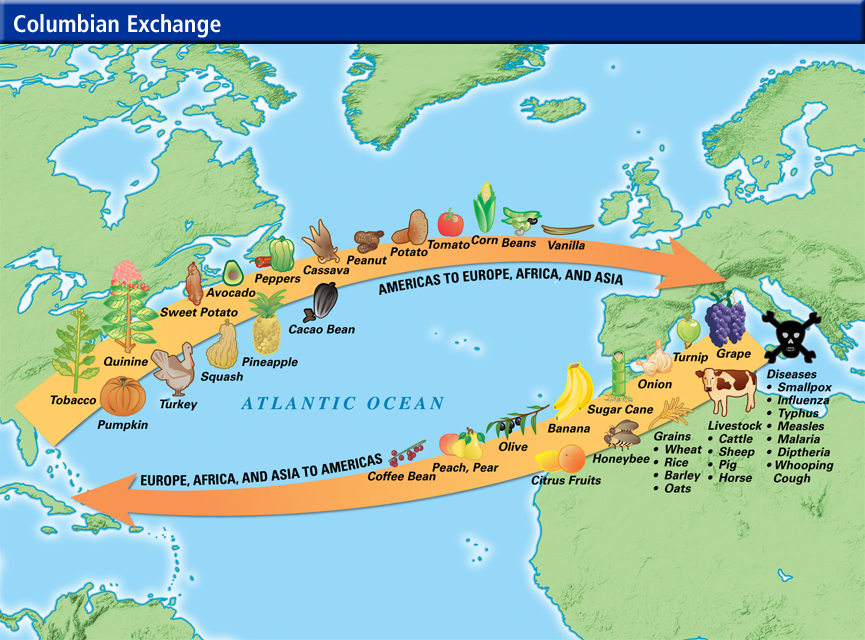How did early people migrate from Asia/Siberia to the Americas? (Hint: geographic feature)
a land bridge / The Bering Land Bridge / The Bering Strait
Which of the three colonial regions relied on plantations and the slave trade for its economy: New England, the Middle Colonies, or the Southern Colonies?
The Southern Colonies
Who gained land after the French and Indian War? Who lost land?
Gained: the British and Spanish
Lost: the French
a. Who did not support the Constitution, pushed for the Bill of Rights, were supported by people such as farmers because they wanted power with average people, and supported the agricultural industry?
b. Who supported the Constitution, favored shipping and business, were supported by elite and wealthy people because they wanted power with the educated and wealthy, and wanted to leave individual right protections up to the state governments?
a. Anti-Federalists
b. Federalists
Who used a form of knotting (quipu) to communicate over their massive empire?
the Incans
Which of the colonial regions was marked by religious freedom, religious differences, and a reliance on fishing: New England, the Middle Colonies, or the Southern Colonies?
New England
Match the term to the correct definition.
Terms: Patriot / Loyalist
Definitions:
A. supports colonies remaining under British rule
B. wants independence from British rule
A. Loyalist
B. Patriot
What was it called in which France/Napoleon sold America/Jefferson their colonial American territory for $15 million?
(Hint: this term contains the name of a state)
the Louisiana Purchase
Match the American empire to their geographical/environmental adaptation and innovation used for farming:
Aztec & Incans. Match each with one of the below:
chinampa: 
terrace farming: 
chinampa: Aztecs
terraces: Incans
Who were the three main countries colonizing the Americas (North and South)?
England/Britain, Spain, and France
Also acceptable: Germany, Scots-Irish, & the Dutch
(Russia is too small to count as a "main" country colonizing the Americas)
What lead to the Revolutionary War?
a. lack of representation and free speech
b. excessive taxation
c. power imbalance between the British soldiers and colonists
d. A and B
e. B and C
f. A, B, and C
f. A, B, and C
a. lack of representation and free speech
b. excessive taxation
c. power imbalance between the British soldiers and colonists
Match the terms to their correct definition OR draw/illustrate and identify the differences
Terms: the Senate OR the House of Representatives
Definitions:
a. The part of Congress that is based on state population because of the Virginia Plan and therefore favors larger states
b. The part of Congress that is equal representation because of the New Jersey Plan and therefore was favored by the smaller states
a. the House of Representatives
b. the Senate
The Columbian Exchange was the widespread transfer of plants, animals, precious metals, commodities, culture, human populations, technology, diseases, and ideas. Which parts of the world did it happen between? Name at least 3.

The Western and Eastern Hemispheres / The Americas and Eurasia/Africa
What was the reason for Europeans transitioning from largely enslaving American indigenous peoples to largely enslaving African peoples? (How did issues with American Indians impact the growth of the Triangular Trade Route?)
Name 2 reasons.

2. Because of European diseases and warfare, American indigenous population was rapidly decreasing.
What were the two events in Boston that helped lead to the Revolutionary War?
Hints: One involved death and one involved tea
the Boston Tea Party and the Boston Massacre
Match the branches of government to their correct associations/definitions:
Executive Branch / Legislative Branch / Judicial Branch
A. the President and their Cabinet - carries out the laws
B. the Supreme Court and court systems - evaluates the laws
C. Congress and representatives - makes the laws
A. Executive
B. Judicial
C. Legislative
Based on the excerpt below, name 4 things that the Iroquois valued in a leader. Point to where you can identify your 4 values.
"Your heart shall be filled with peace and good will and your mind filled with a [longing] for the welfare of the people of the Confederacy. With endless patience you shall carry out your duty and your firmness shall be [lessened] with tenderness for your people. Neither anger nor fury shall find lodgment in your mind and all your words and actions shall be marked with calm deliberation."
Possible answers: leadership, fairness, compassion, considering others, patience, calmness, not getting angry, tenderness towards people, etc.
Put the social classes of the Spanish colonies in order from highest ranking to lowest ranking: American Indians, Mestizos, Peninsulares, enslaved Africans, and Creoles.
Definitions:
- Mestizos - people of mixed ancestry; usually at least half European mixed with either African and/or American Indian heritage
- Peninsulares - born in Spain, moved to
- Creoles - born in the Americas to Spanish parents; the children and descendants of the Peninsulares
1. Peninsulares
2. Creoles
3. Mestizos
4. American Indians (some enslaved and some free)
5. enslaved Africans (and anyone else enslaved)
How did Common Sense by Thomas Paine help to convince colonists to go from neutral to supporting the Patriots? Pick out key words or phrases. Refer to the printout.
Possible answers: betrayal and unfair control of the British, American economy better off without British, etc.
Complete the worksheet on the War of 1812.
Bonus points for each correct answer on the Federalists v Democratic-Republicans.
Up to 500 points. Bones points possible.